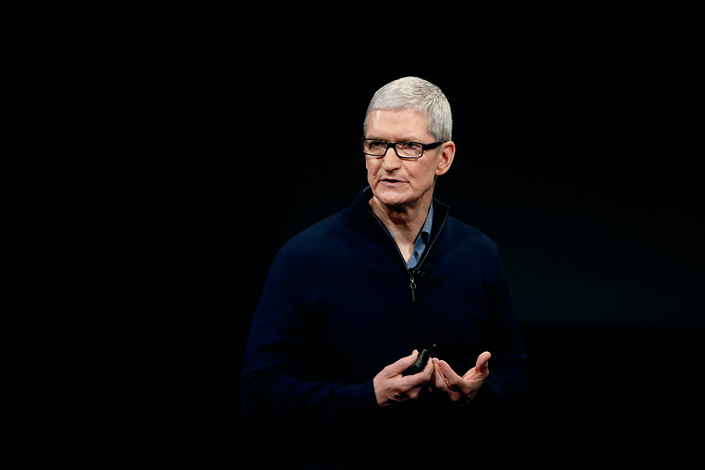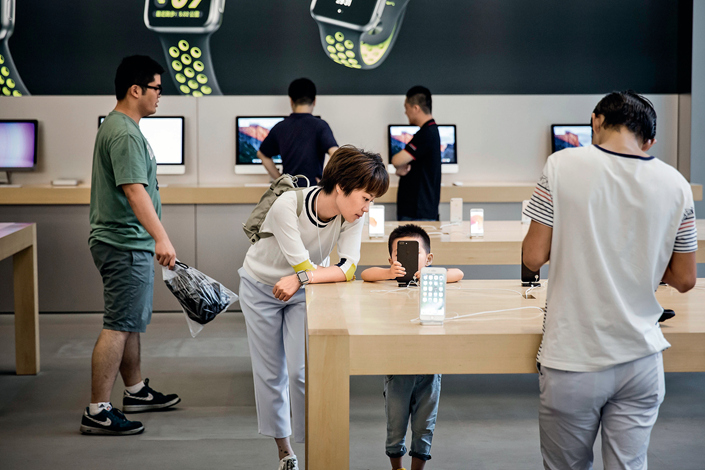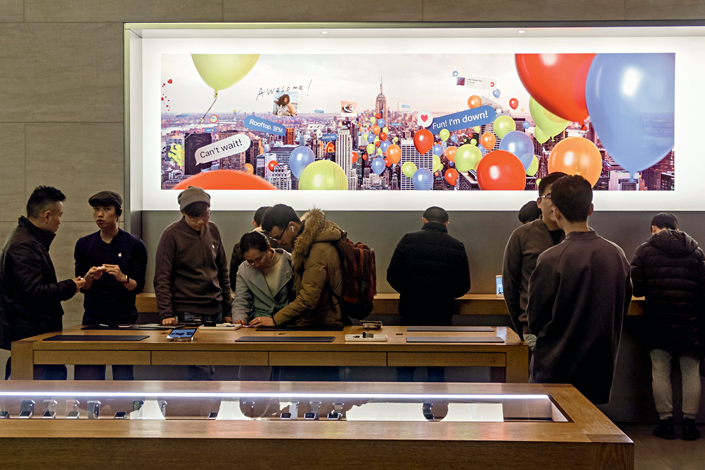Apple CEO sees bright future for China growth, mobile internet, autonomous technology

Editor’s Note:
Apple Inc. CEO Tim Cook was in Beijing last week for a four-day visit, his 11th visit to China since he assumed the top job at the tech giant in 2011. Besides chatting with economist Qian Yingyi at the China Development Forum, meeting with Premier Li Keqiang with other entrepreneurs, and visiting Chinese bike-sharing startup Ofo, he also sat down with Caixin reporters on March 21 to talk about Apple’s performance in China, its business strategy in the face of a saturating smartphone market, his idea on AI technology competition, and his thoughts on Steve Jobs’ heritage. He also shared with us his view on the debate over globalization after U.S. President Donald Trump came into office. Here is an excerpt of the interview.
Caixin: It’s been eight years since you worked with China Unicom to first bring the iPhone to the mainland market. Are you satisfied with Apple’s performance in China so far?
Cook: We’ve been in China for over three decades. The iPhone entered the market eight years ago. Apple’s been here for a long time. The breadth and depth of our relationship with China is enormous. The vast majority of our global supply chain is here. We’ve announced four R&D centers here, the latest two just at the end of last week. We have 1.8 million iOS developers (and other positions related to the iOS ecosystem) that are here, and they’re selling their apps not only to China but exporting them to the world. So there is a huge export market in the app area.
We have a fair number of retail stores, including some of the largest in the world, that are in China. We’ve put all of ourselves here. We’re not just someone who’s here to access the market. We’ve created almost 5 million jobs in China. I don’t think there are too many companies, domestic or foreign, that can say that.
The growth rate in the smartphone market has slowed considerably in recent years. There’s a view in China that the age of the mobile internet is almost over, and we need to look for the next generation of computing platforms, such as VR headsets and autonomous vehicles. What’s your view on this?
The mobile internet, we’ll look back at 2017 and think the mobile internet was in its infancy. It’s at an early phase, not a late phase. The capability, we’re still largely scratching the surface of.
In technology, there’s always a tendency to cast aside whatever is currently happening for the next and the next. Rarely is the next ever as profound as what people think it will be. If you think about the things that are talked about now, it’s hard to see anything that’s been as profound as the smartphone. There are things that will make it even better, like AI, but they’re complementary technologies, not substitution technologies.
 |
|
A woman and child look at a black Apple Inc. iPhone 7 Plus at the Apple Store inside the IAPM shopping mall in Shanghai on Sep. 16. Photo: Getty Images |
Even at Apple, you are also working on new platforms, such as the Apple Watch, Apple TV and things like HomeKit. Aren’t you also searching for the next computing platform?
We’re always working on new things. We don’t work on something new because we’re worried about something we’re currently working on. We work on something new because we think it’s great for our customers.
Take HomeKit as an example. We think this year will be the first time there is an explosion of devices for the home. So that is what we did, and this is why HomeKit complements the iPhone. We integrated HomeKit into iOS. So now any of us can easily configure our homes with home automation. That couldn’t be done before because it was just too hard. You would need to call someone to your home to ask them to do it for you. Now there are switches to garage-door openers, security cameras, ceiling fans. I have my fireplace hooked up to HomeKit, to lighting, to shades of lighting.
There are so many things you can do now. But almost all of those are triggered by one of two things. They are either triggered with Siri or with the home app on the iPhone. It’s not substitution. These two things are seamless. If you think about your use of the iPad and iPhone, if you use both, you work seamlessly. If you are a Macintosh user, you work seamlessly across these three. HomeKit isn’t a device. But it will work seamlessly across iOS platforms.
Apple was the first to bring an AI assistant to the smartphone. You introduced us to Siri in 2011. But now everyone is talking about Amazon’s Echo and Alexa, especially during this year’s CES. What’s your view on Echo?
I think competition makes everybody better.
Generally, if one of us or all of us want a personal assistant, you think about the things you want a personal assistant to do for you. You want a personal assistant sitting with you right now. You want a personal assistance as you’re in the car coming over, in the train or as you are walking. You don’t want a personal assistant only when you happen to be in your kitchen. Yes, you want one over there, too. But not solo because the mind doesn’t work like that. You don’t think about things you need to do only when you are in your kitchen. You cannot really take Echo around with you.
I think they (Amazon) have done a really nice job. But I think when you look at usage, (Apple’s) Siri is getting billions of requests per week. Siri is localized in every major language in the world. The breadth and depth of Siri is very different from (Amazon’s) Alexa. We are just going to keep making it better.
We want to be everywhere, even in your ear. A tap, and you are activating Siri.
Back to the home: I’m excited about the home. Because I think, finally, it’s not for rich people anymore. It’s for everyone. Everyone can see themselves using a security camera, or a light or a switch or a door lock or a thermostat. Now it’s easy to configure. You can hook them up and sing. I feel really good about where it’s gotten to.
A lot of tech companies are betting on autonomous driving. The latest example is Intel acquiring Mobileye for $15.3 billion this month. What role does Apple see for itself in the auto industry of the future?
We’re working on autonomy. We said that. We haven’t given any details of that. We see autonomy as a technology, as being very important. Autonomy means more than a car though, just to be clear. There are lots of things that can move. Things that do move today and things that might become important a few years from now that might not in people’s imagination now.
So autonomy, think of it as a broad technology, a horizontal one, not just autonomous cars. We are working on the technology, we said that. We have a large team.
Autonomy is the sort of the mother of all AI projects. That is what it is. It’s a large AI project. From a technical point of view, that’s what it is. We have some really bright people working on it, and we think it’s important. But we don’t go out too much to conferences to talk about it.
 |
|
People buy mobile phones at one Apple's cellphone retail stores in Shanghai on Feb. 22. Photo: Visual China |
You visited two startups this morning in Beijing, including bicycle sharing company ofo. Last year, you invested $1 billion in Didi Chuxing. Would Apple invest in other Chinese app companies?
We would. It will always be likely on an exception basis. Meaning that we’ve never invested in a developer before, and yet we saw Didi, and Didi was so impressive, we thought their management was just so great. We thought their idea was great. We think China is the best place in the world for ride sharing — the demographics, the economy, etc., are so conducive to it. It’s great from a public policy point of view because you are helping people that may be bottled up in public transportation. And we liked the holistic view; they were doing everything from taxi to the more-traditional private-car kind of thing. There was a strategic alignment. They needed some funds to continue to grow. We really want them to be successful and be global.
What’s your view of the U.S. economy right now?
The economic situation in the U.S. is currently better than it’s been in quite some time. You can see that in the jobs data, in the GDP data, you can see that in consumer sentiment. There are several positive indicators in terms of the economy. You can see the Fed feels the same because they’ve started to increase interest rates. Certainly among some of the CEOs I talk to here and there, everybody is much more positive about the economy than I have seen in a long time.
Would the new U.S. president bring more uncertainty to the economy, given his position on globalization?
I always try to stay out of politics. What we focus on is, we don’t focus on candidates or political parties, we focus on policies. We try to use any influence that we may have or any skill that we may have to influence future legislation and so forth. We’re going to keep putting our energy in that area.
My view on globalization is that you can think of three groups of people. There’s a group of people that globalization has helped tremendously. There’s a group that globalization did not help. There’s a group of people that globalization hurt. Overall, from my point of view, as I look across the world, globalization has been hugely positive for the world. It has lifted hundreds of millions of people out of poverty. However, I also recognize is that it did not help everyone.
What I think is important for the policymakers to do is address what we can do to help those people. Get into details about what policies can help people. I don’t believe you help these people by turning our backs on globalization. You want to keep this going because it’s great. But we must fix this. In order to fix something, you have to admit that it’s there. That it is a problem. It’s taken too long for some countries to admit it’s a problem. But now I think people are. So I feel optimistic about that. I do think there are ways to address it. I don’t think it’s an impossible task. I hope that the politicians and people will put their attention on fixing that problem.
Before you joined Apple, you held high-level positions in IBM and other companies. When you came to Apple in 1998, did you ever think you would be promoted to CEO or was that a total surprise?
That is a long story. But the short version is that I thought Steve (Jobs) would always be the CEO of Apple when I worked there, while I was at Apple. Because Steve was so associated with the company and was such an incredible CEO. I had sort of convinced myself that he would be fine, from a health point of view. That he would bounce back because he always did. I never really deeply thought about the scenario that occurred. (Editor’s note: Jobs died of complications from pancreatic cancer on Oct. 5, 2011.)
He told me six weeks before he passed away that he was passing the baton and I would be CEO. Even then, I thought he would be chairman for many, many years. I had blocked that possibility from my head. We all want the best to occur. I convinced myself that it would.
Obviously, he had told me many years before how he saw things playing out, and was making sure that I had responsibilities that would help prepare me. He saw a major part of his role being to make sure there was a professional transition. He even told me when he made the final decision in August 2011 that one of the reasons he was doing it was that Apple had never had a professional transition at the CEO level. It was always somebody got fired and someone new came in. One of the things he wanted for Apple was to have a professional transition for the CEO.
Looking back, the transition was rather smooth, which is very difficult for a large company like Apple. Is there any secret behind the smooth transition?
There are many secrets, not one. It’s important for an incumbent CEO to view part of their key responsibility is to prepare one or more internal successors to succeed them. Many CEOs don’t do that. That’s sort of one secret. Steve did that.
The second thing is that particularly for an iconic founder like Steve — bigger than life, the co-founder of the company — it’s important for whoever goes in to chart their own course because if they try to mimic that person, they’re going to fail. Nobody will replicate the traits. That’s true with almost every iconic founder. It may be true with every CEO, but it’s particularly true with somebody so wrapped up in the identity of the company.
Steve helped me with this because he told me that he did not want me to think ever what he would do. That I should do the right thing.
In a way, he removed a burden and it freed me to always think what’s right, not to think, “What would he do if he were here?” I have to say, I followed his advice. I’ve never really thought about what he would do.
A lot of Chinese CEOs admire Steve Jobs for his ability to see what’s next. In your opinion, what made him such a visionary?
There are different skills that were important at different points of time for Apple. In 1997 (when Jobs returned to Apple after a 12-year hiatus), probably the most important thing and most important characteristics that Steve brought were focus. He got the company focused on a very few things, simplified the product line. There was one objective — make the best products in those areas. That’s what the company put its energy into.
He was brilliant in doing that. He also, in a very rare move at the time — everybody forgot this in that part of the story — everybody in the PC space was diverting all of their energy to enterprise because that’s where the profits were. Steve said, “I am focusing on the consumer.” I thought it was brilliant when he interviewed me. Because everyone was running from here. And he was saying, “No, I’m focusing here,” and he was right.
The other thing that is missed is a lot of the retrospective stuff. Everyone forgets now, at that point in time, almost everybody from academia and industry thought that the model that Apple had, that Apple created an operating system and the hardware both, they thought it was a losing model. That vertical integration could never work. So you saw at that time, Microsoft made an operating system, Intel made the engine, companies like Dell and HP did the integration. Everybody thought that model would be the only winning model. Now when you look back, Apple has used that model not only on the Mac, but on the iPhone, the iPad, on the (Apple) Watch. That’s important for us.

- 1Cover Story: China Carves Out a Narrow Path for Offshore Asset Tokenization
- 2Drownings Shake Chinese Enthusiasm for Travel to Russia
- 3Over Half of China’s Provinces Cut Revenue Targets
- 4Li Ka-Shing’s Port Empire Hit by Forced Takeover Amid Panama Legal Dispute
- 5China Business Uncovered Podcast: A $15 Billion Bitcoin Seizure and the Fall of a Cybercrime Kingpin
- 1Power To The People: Pintec Serves A Booming Consumer Class
- 2Largest hotel group in Europe accepts UnionPay
- 3UnionPay mobile QuickPass debuts in Hong Kong
- 4UnionPay International launches premium catering privilege U Dining Collection
- 5UnionPay International’s U Plan has covered over 1600 stores overseas




